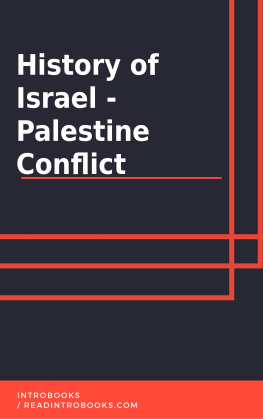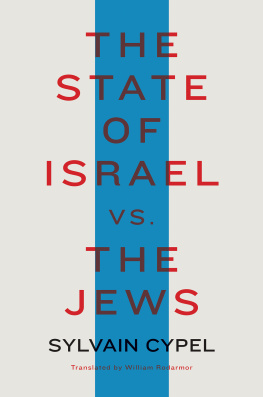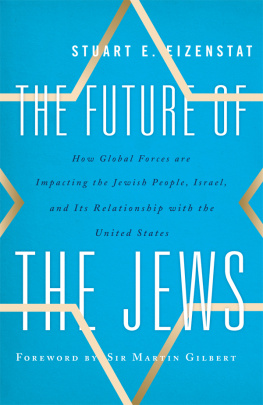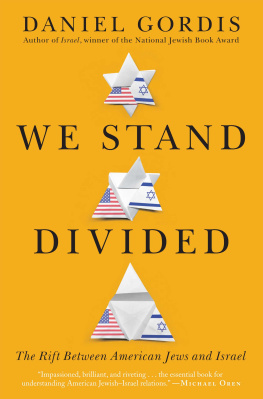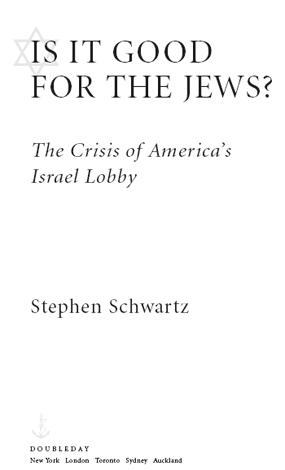
CONTENTS
Dedicated to L.D.2
for their inspiration;
to the Jewish genius of Larry David;
and to the hidden imam
with memories of grapes and pears
ACKNOWLEDGMENTS
I owe everything in the achievement of this work to my editor and friend Adam Bellow, assisted by colleagues Daniel Feder and Chris Fortunato. But I would be remiss in not also thanking Seth Lipsky and J. J. Goldberg of the Forward, who published my work, and my friends Ronald Radosh and Fred Siegel, who helped with some details. Il consigliere Richard Torre also deserves his customary recognition. And finally, a nod to Lo Malet, who showed the way. Nevertheless, I alone am responsible for all opinions, as well as any errors or infelicities, in this book.
Washington-Dubrovnik-Amsterdam-Warsaw-Jerusalem
20042006

A lobby is like a night flower, Steven J. Rosen, former policy director of the American Israel Public Affairs Committee (AIPAC), is reported to have written in an internal memorandum. It flourishes in the dark and dies in the sun. Unfortunately, however, Washington is not a nocturnal town. Most business is transacted during the day, and Washingtonians rest at night. Caf and bar life is limited even when compared to less important cities such as Frankfurt and Zurich, to say nothing of New York. That and its provincial love of gossip ensure that many significant actions taken in Washington, certainly by institutions and individuals as powerful as AIPAC and Rosen, will inevitably be made public.
The white marble and limestone of official Washington give it the feeling of a holy city, the center of a great empire. There is an implied chastity in the Capitol, the White House, and the Lincoln Memorial, as well as the museums and colleges and religious sites. In its own way there is no city more American, or at least more intellectually self-conscious of its American identity. Even the Pentagon has a uniquely American quality: the first thing a visitor sees on getting past the security checks is a vast shopping mall, offering everything from sports shoes and aspirin to hot lasagna and military badges. This is because, first, there are few businesses in the area around the building, and second, employees, especially senior and middle staff, are expected to remain in the building throughout their workday. For those important enough, meals may be served at their desks.
I had first come to Washington from California in my mid-thirties, during the Reagan era. My stays were brief, however, and I did not make the capital a home until sixteen years later, at the beginning of George W. Bushs first term. In the meantime I had gone from San Francisco, where I had lived forty-eight years, to the city of Sarajevo, Bosnia-Herzegovina, and an investigation of Muslim radicalism that would produce my book The Two Faces of Islam. But I had also been covering Jewish affairs since 1992 for the Forward, formerly a Yiddish daily, reinvented as a national Jewish weekly in English. At the end of 2000 I took a job as Washington bureau chief for the Forward.
Like any other sojourner from the hinterlands, in 2000 no less than in 1984, I was dazzled by the imperial gravitas of the Hill and its monumental institutions. But, as with any normal person, it all eventually grew familiar. There came a time when visiting the Pentagon for me was interesting mainly because you could buy terrific ice cream so near the offices I went to. Otherwise it was about as exciting as the police headquarters and bottom-rung courts in the municipal Hall of Justice I had covered as a reporter in San Francisco.
Nevertheless, I always had the sense that federal employment in Washington was a special calling; one had, after all, taken an oath before the flag and been sworn in as a U.S. government official. One owed the country something for that privilege. My vision was less that of James Stewart in Mr. Smith Goes to Washington than that of William Holden as a naively liberal newspaperman in the 1950 film Born Yesterday.
As summer 2004 drew to a close I traveled from Washington to another beautiful, inspiring, and historic city of white stone, distinguished in the annals of democracy: Dubrovnik in Croatia. In 1776, the illustrious commercial republic on the Adriatic coast, then called Ragusa, had been the first state in the world to acknowledge American independence. I went there to deliver a research paper on local Jewish history. The weather was perfect, and the houses, churches, and palaces of marble and limestone in white Dubrovnik shone in the sun like the most prominent buildings in Washington.
There, walking with a lovely American woman and her little dog, I first received word of the AIPAC-Pentagon spy scandal. It was written up in the International Herald Tribune at the end of August. The FBI was investigating a minor Defense Department official, Lawrence Anthony Franklin, age fifty-eight, for handing over secret information to Israel through AIPAC. Young, ebullient AIPAC spokesperson Josh Block hotly denied the accusations. In a situation potentially much worse than the 1985 case of Jonathan J. Pollard, a spy for Israel detected in the civilian ranks of U.S. naval intelligence, Americas Pro-Israel Lobby, as AIPAC prefers to be called, would be accused of espionage, having been caught with its hands in the worlds most alluring cookie jar: the Pentagon.
Foreign-policy influence in Washington is always, finally, about the Defense Department and its universe of contracts. This was illustrated when AIPAC lost the 1981 battle over the sale of AWACS planes to the Saudi monarchy and was reinforced when U.S.-Israeli military cooperation resumed with the lifting of U.S. sanctions imposed after Israels 1982 incursion into Lebanon. Vendors and lobbyists, representing every industrial, political, and state interest, from Saudi front men recycling their cash and technology offers in cahoots with shady enterprises in Sudan to run-of-the-mill promoters of American corporate giants and think tanks, always buzzed around the building.
Soon Franklins fellow targets in the investigation were named. They were AIPAC policy director Steve Rosen and an Iran expert for the organization, Keith Weissman. Rosen and Weissman would be accused of transferring secret information given to them by Franklin, to Israeli embassy political officer Naor Gilon and another Israeli diplomat, Rafi Barak.
I was not particularly close to Rosen, but everybody who covered Jewish Washington as a reporter had met and observed the AIPAC chief commissar, who was in his early sixties, with short gray hair. He resembled the New York banker Felix Rohatyn, but unlike the urbane Manhattanite, his character was crude. AIPAC had once pressured the Washington Jewish Week to kill a story about a birthday party for Rosen at the organizations headquarters, where a stripper performed.
On Middle East policy and its related issues, Rosen was almost comically hard nosed, but he had the eyes of a shark and conveyed an air of something close to physical intimidation. It was said that his family had been Stalinist Communists, and Rosen himself was tarred with that association, which was generally employed to suggest that he had never lost the ruthlessness characteristic of the Muscovite milieu.
Next page


